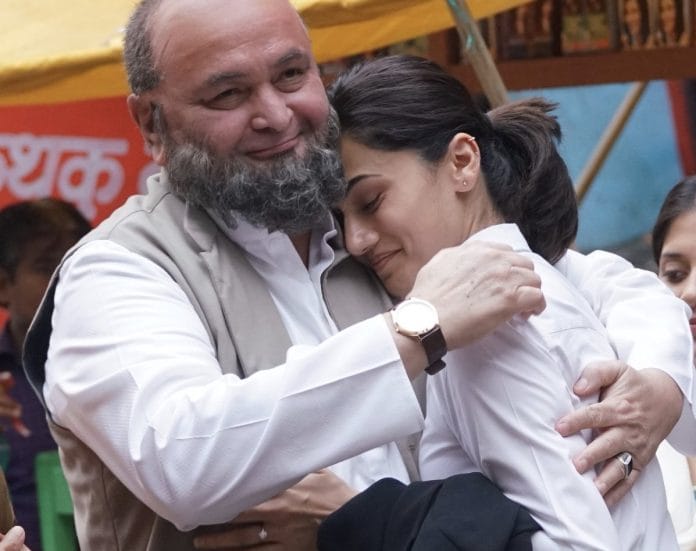Mulk, starring Rishi Kapoor, is among a new crop of films from the past decade that will shape the future of popular culture’s space for Indian Muslims.
Filmmaker Anubhav Sinha’s new release Mulk, an investigative drama about Islamophobia, is an angry film. Set in Varanasi, the film examines the ideas of identity and unity through the story of a Muslim family that loses a radicalised terrorist son after a bomb explosion.
In the unfolding drama, Sinha asks difficult questions about the place of a Muslim in contemporary India. It’s a persuasive, but uneven, film. Sinha’s resentment towards the politics of polarisation that pervades the Indian society is more than apparent. In that clear enunciation, Sinha manages to bring spirited anger to a new crop of Hindi films with Muslim protagonists.
After the demise of Bollywood’s ‘Muslim socials’ genre, the Muslim identity in Hindi films has found a growing assertiveness in the past decade. In 2007, Shah Rukh Khan starred in the iconic sports drama Chak De India and heralded a new era of films that scrutinised the Muslim identity as well as the society. The Muslim social had made way to the ‘patriotism trial’ template of new movies.
Also read: Pakeezah to Race 3- Tracing the journey of Muslim social this Eid
In one of its most brutal moments, the disgraced Muslim hockey coach in Chak De, says: “Lekin tumse haarne ka afsos nahi hai mujhe. Afsos is baat ka hai ki main apne mulk se haar gaya. Jisko mera khoon pasina dil jaan dekar bhi yakeen nahi hota ki main uski team se khela tha aur zindagi bhar uski team se hi khelta rahunga (The regret is not that I lost to you. It’s of losing to my country, which refuses to believe that I played for her and will continue to play for her). ”
This line in the film neatly articulates the disheartening questions Muslims face on a daily basis.
Despite his superstardom and the commercial need to be apolitical, Khan has been the most significant face of Muslim identity over the years, both on screen and off. Especially, through his work in My Name Is Khan (2010), Dear Zindagi (2016), Raees (2017) and even a cameo in Ae Dil Hai Mushkil (2016). His characters in these films brought the focus on religious identity in equal measure as much as they eased the burden of representation.
Widening the net a bit, Karan Johar’s My Name Is Khan, released a few months after Kabir Khan’s similarly-themed New York (2009), showed the identity of Indian Muslims in a post-9/11 world.
Vishal Bhardwaj’s Hamlet adaptation Haider (2014) brought the much-needed Kashmiri Muslims’ nationalism dilemma to the front. Juxtaposing the personal against the political, Bhardwaj used his characters to tell the struggle of a people.
Shahid (2013), Hansal Mehta’s biopic of human right lawyer Shahid Azmi starring Rajkummar Rao, told the fascinating story of the radicalisation and the redemption of an extraordinary individual.
Interestingly, Salman Khan and Shah Rukh Khan had two unusual, comparative iterations of the Muslim lead in Sultan (2016) and Raees. In the former, director Ali Abbas Zafar portrays the brawny Khan as a wrestler from Haryana whose religious identity is almost incidental.
In Rahul Dholakia’s crime thriller Raees, however, the Gujarati gangster’s religion and his eventual politics was the main subtext of the film. In a fairly stark and provocative riot scene, Dholakia hinted at L.K. Advani’s infamous ‘rath yatra’ that ended up polarising the country. Raees, the gangster, tells the local politician to stay away from ‘his area’.
A new kind of political portrayal of Indian Muslims is here.
In Meghna Gulzar’s Raazi, the female lead Sehmat (Alia Bhatt) is a sensitive, scared young Kashmiri girl who has to prove her patriotism in Pakistan with her body and soul. That depiction is also a significant departure from its pacifist refrain.
Also read: Raazi shows the kind of nationalism that’s not thrust upon, but rather self-created
With the rise of a Right-wing polity and incidental technological changes, minorities around the world are straddling a turbulent phase. In these times, Bollywood is trying to find a new, firm idiom for the Indian Muslim with questions about justice and citizenship in mind. Mulk, and other such efforts from the past decade, will shape the future of popular culture’s space for Indian Muslims.






